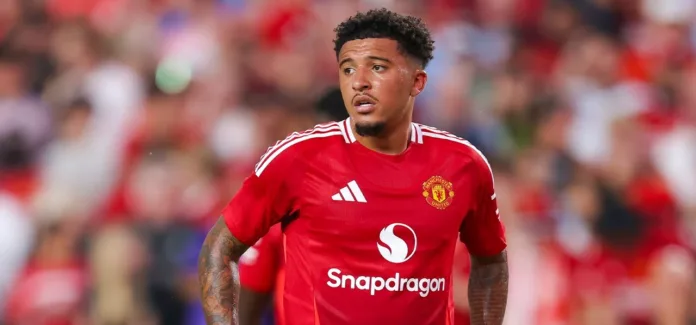Amidst a challenging start to the season, Manchester United stands firmly behind manager Erik Ten Hag, while Jadon Sancho departs for Chelsea in a late transfer.
Manchester United’s leadership has publicly reaffirmed their commitment to Erik Ten Hag, despite the team’s underwhelming start to the Premier League season. Following a strong finish last season, which included a victory in the FA Cup, the Dutch manager was granted a one-year contract extension over the summer. However, a disappointing eighth-place league finish and early-season losses to Brighton and Liverpool have sparked renewed scrutiny.
Chief Executive Omar Berrada addressed these concerns head-on, emphasizing the club’s unwavering support for Ten Hag. “Do we still believe in Erik? Absolutely. We think Erik is the right coach for us, and we’re fully backing him,” Berrada declared just before United’s match against Liverpool. Sporting Director Dan Ashworth echoed this sentiment, highlighting his close collaboration with Ten Hag since assuming his role eight weeks ago. Ashworth described his role as removing operational burdens from the manager so that Ten Hag could focus on coaching and match preparation.
This vote of confidence comes amidst significant changes within the squad. United’s summer transfer window saw the arrival of high-profile players such as Matthijs De Ligt, Manuel Ugarte, and Joshua Zirkzee. However, departures have been equally significant, with Jadon Sancho and Scott McTominay among the most notable exits. Sancho, who had a public falling out with Ten Hag last season, returned to Borussia Dortmund on loan in January before rejoining United for pre-season. Despite an apparent reconciliation, the winger made a surprise deadline-day move to Chelsea, with an obligation for the London club to buy him permanently.
Ashworth explained the reasoning behind Sancho’s transfer, noting that the player expressed a desire to explore new opportunities. “We felt we had enough depth in that particular position, so it was something we were willing to consider if it was good for both parties,” Ashworth said. McTominay, another homegrown talent, ended his two-decade association with the club by transferring to Napoli. While the move was influenced by the Premier League’s profit and sustainability rules, Ashworth emphasized that the decision was also driven by the player’s wish for a new challenge.
Despite the early setbacks this season, Manchester United’s leadership remains confident in Ten Hag’s ability to lead the team forward. The club’s support for their manager is clear, even as they navigate the complexities of squad management and the high expectations that come with being one of the world’s most famous football clubs.
Analysis:
Political: The steadfast support for Erik ten Hag highlights the intricate politics within a major football club like Manchester United. In the highly competitive environment of the Premier League, managerial positions are often precarious, with decisions influenced not only by on-field results but also by broader strategic goals. By publicly backing Ten Hag, Manchester United’s leadership signals a commitment to long-term stability and vision, resisting the knee-jerk reactions that often accompany early-season disappointments. This approach contrasts with the short-termism seen in other clubs, where managerial changes are frequently used as a quick fix. United’s decision could set a precedent in the league, emphasizing the importance of continuity and strategic planning over immediate results.
Social: The transfer of Jadon Sancho to Chelsea reflects broader social trends in football, particularly the increasing agency of players in determining their career paths. In an era where athletes have significant platforms and influence, the decisions they make—such as Sancho’s move—are closely watched and analyzed by fans and pundits alike. The move also highlights the growing expectation for clubs to respect the personal and professional desires of their players, even when it involves losing key talent. This shift in power dynamics between players and clubs mirrors broader societal debates about autonomy, career mobility, and the role of employers in supporting the aspirations of their employees.
Racial: Sancho’s transfer also subtly touches on racial dynamics within the sport. As a prominent Black player, Sancho has been a significant figure in discussions about race and representation in football. His career moves are often viewed through this lens, with his treatment by clubs and managers being scrutinized for any racial undertones. While there is no direct evidence to suggest racial factors played a role in his departure, the broader context of how Black players are perceived and treated in top European leagues remains a critical area of discussion. Sancho’s move could prompt further reflection on how racial issues are addressed within the sport, particularly concerning player-manager relationships and media narratives.
Gender: The backing of Ten Hag and the handling of transfers like Sancho’s also reflect the ongoing gendered expectations in football management and leadership. Football, traditionally male-dominated, often carries implicit gendered expectations around leadership styles and decision-making. The emphasis on Ten Hag’s tactical acumen and the strategic reasoning behind player transfers align with stereotypical masculine attributes of logic, strength, and decisiveness. However, the increasingly collaborative approach seen in modern football management, as exemplified by Ashworth’s role in supporting Ten Hag, suggests a gradual shift towards valuing traditionally ‘feminine’ qualities like empathy, communication, and team-oriented leadership. This shift could gradually reshape the leadership landscape in football, promoting a more balanced and inclusive approach.
Economic: The transfer decisions made by Manchester United, particularly the sale of homegrown talent like Scott McTominay, underscore the economic pressures facing Premier League clubs. The league’s profit and sustainability rules necessitate a careful balancing act between maintaining a competitive squad and adhering to financial regulations. Selling players like McTominay, who has been with the club since childhood, is not just a footballing decision but also an economic one. Such moves highlight the growing importance of financial management in football, where economic viability often dictates squad composition. This trend reflects broader economic realities in professional sports, where financial health is increasingly prioritized alongside on-field success. The need to comply with financial fair play regulations could lead to more pragmatic, economically-driven decisions by clubs, potentially at the expense of sentimental or legacy considerations.
